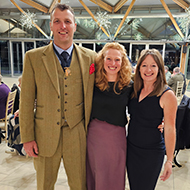
Kim Hamer takes over the role from Joe Henry.
Veterinary surgeon and academic clinician Kim Hamer has been appointed president of the Sheep Veterinary Society at its Autumn conference.
Kim succeeds Joe Henry, who has become senior vice president following the retirement of David Wilson from the committee. Farm veterinary surgeon Phillipa Page joins the officials as junior vice president.
Raised on the Welsh Borders in a farming and veterinary family, Kim is passionate about disease prevention, supporting farms and teaching students. Her work at the School of Biodiversity One Health and Veterinary Medicine at the University of Glasgow sees her involved in research and supervising residents at the European College of Small Ruminant Health Management.
Kim has extensive experience working in clinical practice, including eight years in mixed practice in the Welsh/English Borders, focusing on farm animal medicine and sheep preventative health. She spent two years at the Farm Animal Practice at the Royal (Dick) School of Veterinary Studies, during which she co-authored Sheep Keeping as part of The Professional Smallholders Series with Phillipa Page. She is currently undertaking a PhD in veterinary ecology.
Kim's research encompasses a wide array of topics related to sheep health, including sheep parasitology, micro-mineral nutrition, and neurology. Currently, she is focused on antibiotic use in remote rural settings and exploring how a digital diagnostic decision-support tool could help improve clinical outcomes for sheep and goats in sub-Saharan Africa.
The Sheep Veterinary Society brings together all those interested in the welfare and production of sheep, including vets, flock owners and advisors from across the UK, Europe and the world. Members of the Society and Committee are actively engaged in various groups and initiatives, contributing to ideas and policies that will directly influence the future of the sheep farming industry.
The Autumn Sheep Veterinary conference took place in Morpeth, Northumberland, 23-25 September.
Image (C) Sheep Veterinary Society.



 The Federation of Independent Veterinary Practices (FIVP) has announced a third season of its podcast, Practice Matters.
The Federation of Independent Veterinary Practices (FIVP) has announced a third season of its podcast, Practice Matters.